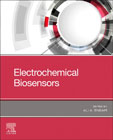
Electrochemical Biosensors summarizes fundamentals and trends in electrochemical biosensing. It introduces readers to the principles of transducing biological information to measurable electrical signals to identify and quantify organic and inorganic substances in samples. The complexity of devices related to biological matrices makes this challenging, but this measurement and analysis are critically valuable in biotechnology and medicine. Electrochemical biosensors combine the sensitivity of electroanalytical methods with the inherent bioselectivity of the biological component. Some of these sensor devices have reached the commercial stage and are routinely used in clinical, environmental, industrial and agricultural applications. Describes several electrochemical methods used as detection techniques with biosensorsDiscusses different modifiers, including nanomaterials, for preparing suitable pathways for immobilizing biomaterials at the sensorExplains various types of signal monitoring, along with several recognition systems, including antibodies/antigens, DNA-based biosensors, aptamers (protein-based), and more INDICE: 1. Introduction2. Electrochemical detection techniques3. Surface modification methods4. Typical used nanomaterials-based carbon in fabrication of biosensors5. Typical used nanomaterials-based non-carbon materials in fabrication of biosensors6. Types of monitoring7. Enzyme-based electrochemical biosensors8. Aptamer-based electrochemical biosensors9. Protein-based electrochemical biosensors10. Other receptor-based electrochemical biosensors
- ISBN: 978-0-12-816491-4
- Editorial: Elsevier
- Encuadernacion: Rústica
- Páginas: 350
- Fecha Publicación: 01/08/2019
- Nº Volúmenes: 1
- Idioma: Inglés
